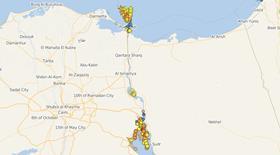
Fresh produce suppliers to the European market are watching developments along the Suez Canal nervously, as attempts to free a giant container ship blocking the waterway continue over the weekend.
The 1,300ft-long Ever Given ran aground across the southern end of the canal on 23 March, making it impossible for other vessels to pass along the vital trade route.
With a large number of ships waiting in line to enter the canal, the impasse could have potentially serious implications for supplies of fresh produce to Europe – in particular for products from key supply countries, including New Zealand, India and other parts of Asia.
Many will be waiting to see if the ships carrying their products end up having to sail instead around South Africa, a journey that is estimated to add about 10 days on average.
Nitin Agrawal, managing director of India’s largest table grape exporter Euro Fruits, said the unexpected halt had come at a difficult time for Indian grape exporters, who are already facing adverse weather conditions, the effects of lockdown, and poor market conditions.
“All of the Indian grape containers headed towards the UK and Europe have to go through this Suez Canal,” he explained. “Today there are so many Indian grape containers headed towards Europe that are likely to be delayed due to this force majeure condition.”
However, he did point out that shelf-life was not expected to be a problem, and the products themselves could withstand a delay.
“Typically, Indian grapes are very strong with good shelf-life so there should be no major impact on the overall quality of the grapes,” he said. “Lets all keep our fingers crossed and pray for an early solution to this massive issue.”
Back of the queue
One apple exporter in New Zealand told Fruitnet that their first shipment of the season had joined the back of a lengthening queue of ships lining up to the south of the waterway.
“The shipping company is waiting to see if they [must] reroute some shipments via the Cape of Good Hope,” he explained. “If it gets cleared this weekend, the disruption should be minimal. But if they get rerouted I think it will potentially add one or two weeks to the shipping time.”
For many companies involved in shipping fresh fruit and vegetable over long distances to reach their markets, the Suez impasse represents just the latest problem in a highly unpredictable season.
For various reasons linked mainly to the pandemic, shipping services have been far less reliable than usual, with schedules often changed at short notice.
Linda Carobbi of international freight forwarding company Savino Del Bene agreed that the Ever Green episode made it an even more challenging year for global shipping.
“This Suez issue will deeply affect the trades with Red Sea, Middle East, India/Pakistan, Far East, Australia and New Zealand,” she commented on LinkedIn.
“We may expect drastic reductions in containers (dry and reefer) availability for at least the entire month of April, because most vessels are coming from Asia and they are blocked in Suez.
“Ocean carriers are already announcing a concrete stop in accepting bookings for above destinations. I am afraid it will take weeks, maybe months, to go back to a normal situation – but pls let me add that in this year, there is nothing ‘normal’ in the worldwide shipping.”
Additional reporting by Chris White.



